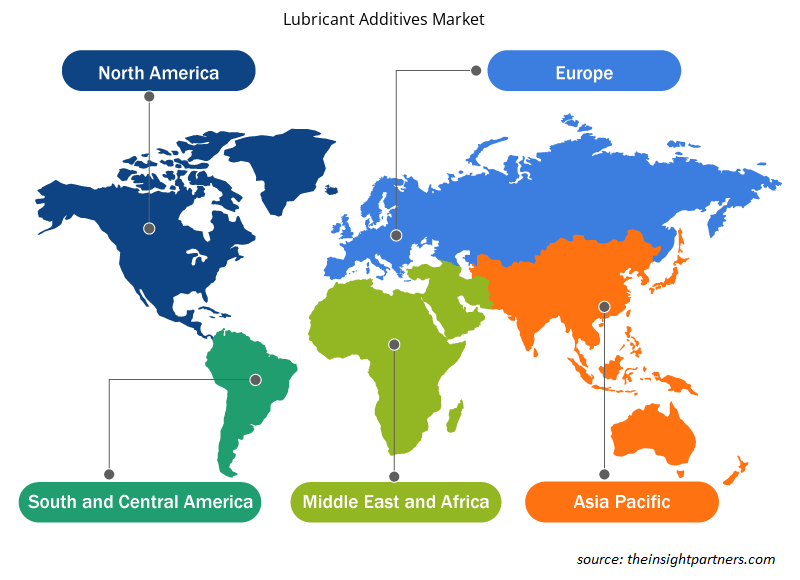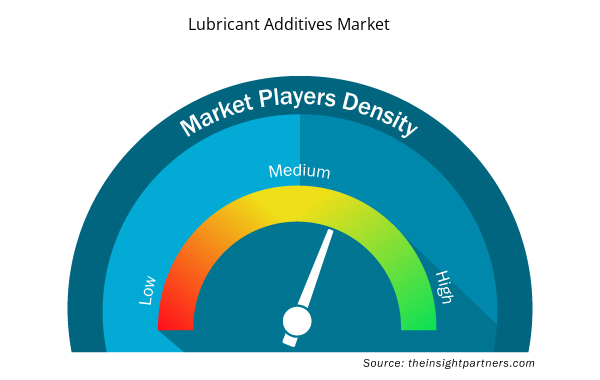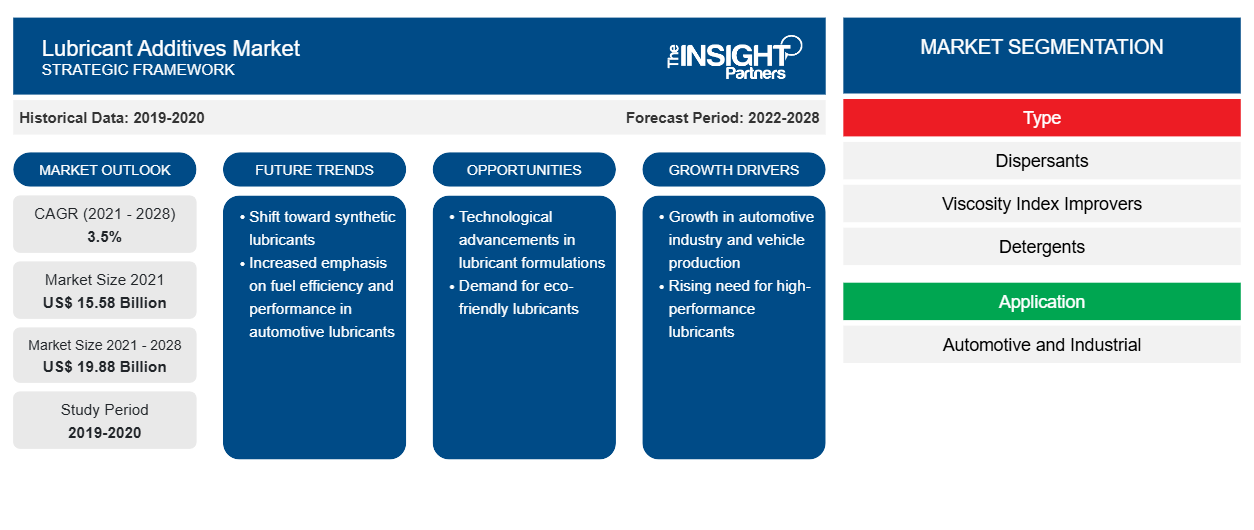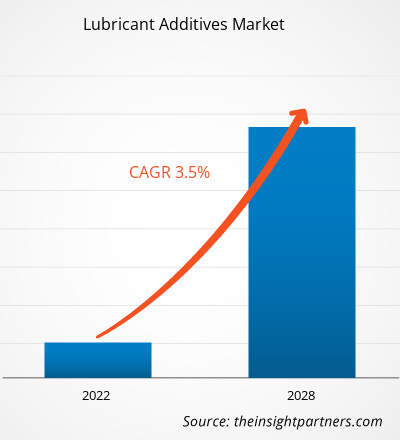윤활유 첨가제 시장 규모는 2021년에 155억 8,490만 달러였으며, 2028년까지 198억 8,012만 달러에 도달할 것으로 예상됩니다. 2021년에서 2028년까지 연평균 성장률은 3.5%가 될 것으로 예상됩니다 .
윤활제 첨가제는 합성 윤활제의 가공에 사용되며, 이는 천연 미네랄 오일보다 우수한 특성으로 인해 산업 및 자동차 부문에서 일반적으로 사용됩니다. 따라서 산업 및 자동차 부문의 번영은 합성 윤활제에 대한 수요를 증가시킵니다. 엔진 오일은 자동차 및 산업 부문에서 가장 일반적으로 사용되는 윤활제입니다. 더 높은 점도 지수, 낮은 휘발성, 유동점 및 더 큰 열 안정성을 포함하여 우수한 물리적 및 화학적 특성을 가지고 있습니다. 윤활제에 점도 개질제 및 유동점 강하제와 같은 첨가제를 추가하면 물리적 및 화학적 특성이 향상됩니다. 따라서 다양한 산업에서 윤활제를 광범위하게 적용하는 것이 윤활제 첨가제 시장을 주도하는 핵심 요인이며, 윤활제와 첨가제를 혼합하면 성능과 서비스 수명이 향상됩니다.
2020년 아시아 태평양 지역은 글로벌 윤활유 첨가제 시장 에서 가장 큰 점유율을 차지했습니다 . 이 지역 시장 성장에 기여한 주요 요인은 자동차 및 기타 제조 산업에서 윤활유 첨가제에 대한 수요가 증가하고 있다는 것입니다. 자동차 생산이 증가함에 따라 이 지역에서 자동차 부품 및 구성 요소의 개발이 증가하고 자동차 연료 제조업체의 지속적인 혁신이 결합되어 윤활유 시장에 수익성 있는 기회가 생겨 시장 성장이 촉진됩니다. 또한, 특히 중국과 인도에서 증가하는 건설 활동은 글로벌 시장 참여자들이 아시아 태평양 지역에서 사업을 시작하도록 유도할 가능성이 높습니다. 대형 상용차는 소비자들이 높은 운반 능력과 강력한 서스펜션 시스템으로 인해 선호하기 때문에 중국에서 널리 사용됩니다. 따라서 운송 활동에 도움이 됩니다. 예를 들어 트럭과 같은 대형 상용차는 무거운 하중 운반 능력으로 인해 물류, 건설 및 농업에서 널리 사용됩니다. 주로 모든 지형에서 한 장소에서 다른 장소로 잔해물과 자재를 운반하는 데 사용됩니다. 이러한 모든 요인이 윤활유 첨가제에 대한 시장 수요를 촉진합니다.
귀하의 요구 사항에 맞게 이 보고서를 사용자 정의하세요
이 보고서의 일부 또는 국가 수준 분석, Excel 데이터 팩을 포함하여 모든 보고서에 대한 사용자 정의를 무료로 받을 수 있으며 신생 기업 및 대학을 위한 훌륭한 혜택과 할인 혜택을 이용할 수 있습니다.
- 이 보고서의 주요 시장 동향을 알아보세요.이 무료 샘플에는 시장 동향부터 추정 및 예측까지 다양한 데이터 분석이 포함됩니다.
윤활유 첨가제 시장에 대한 COVID-19 팬데믹의 영향
COVID-19 팬데믹은 윤활유 첨가제 생산에 사용되는 원자재의 공급망이 중단되면서 2020년 글로벌 시장에 심각한 영향을 미쳤습니다. 여러 국가에서 봉쇄 조치가 완화되고 많은 산업에서 운영 활동이 재개되면서 2021년부터 윤활유 첨가제에 대한 수요가 회복되었습니다. 또한 COVID-19 백신 접종 프로그램의 빠른 속도가 윤활유 첨가제 시장의 성장을 뒷받침하고 있습니다.
시장 통찰력
급속한 산업 성장은 윤활유 첨가제 시장 성장을 촉진합니다
윤활제는 산업 분야에서 사용되는 핵심 구성 요소 중 하나로, 장비가 높은 효율과 최대의 신뢰성으로 작동하도록 돕습니다. 미네랄 및 합성 윤활제, 그리스, 압축기 오일, 절삭유는 자동차, 석유 및 가스, 섬유, 유리, 발전, 제지 및 펄프, 화학 및 석유화학, 농업, 제조, 식품 및 음료, 제약 산업 등에서 첨가제로 사용되는 여러 유형의 윤활제입니다. 전 세계적으로 이러한 산업이 성장함에 따라 윤활제와 윤활제 첨가제에 대한 수요가 크게 증가하고 있습니다. 특히 아시아 태평양 지역의 섬유 마감 산업은 산업용 윤활제에 대한 수요가 높습니다. 아시아 태평양 지역의 섬유 산업에서 산업용 윤활제에 대한 수요가 높습니다. 따라서 다양한 산업에서 윤활제를 광범위하게 적용하고 산업 부문에서 빠르게 성장하는 것이 윤활제 첨가제 시장을 주도하는 핵심 요인입니다.
애플리케이션 인사이트
응용 프로그램을 기준으로 시장은 자동차 및 산업으로 세분화됩니다. 자동차 부문은 2020년에 더 큰 시장 점유율을 차지했습니다. 윤활유 첨가제는 엔진 오일과 모터 오일에 사용되어 작동 시 오일의 무기 물질 응집을 방지합니다. 고온에서 점도를 유지하기 위해 멀티그레이드 엔진 오일, 기어 오일, 자동 변속기 오일, 파워 스티어링 오일, 그리스 및 일부 유압 오일에 윤활유 첨가제에 대한 수요가 높습니다. 많은 자동차 제조업체가 차량의 연비 개선에 투자하고 있으며, 이는 향후 몇 년 동안 시장 성장에 더욱 기여할 가능성이 높습니다.
윤활유 첨가제 시장의 몇몇 주요 시장 참여자는 Evonik Industries AG, The Lubrizol Corporation, LANXESS, Nouryon, Mol-lub Kft., Dover Chemical Corporation, Croda International plc, Chevron Corporation, BASF SE, EXXON MOBIL CORPORATION입니다. 이러한 회사는 윤활유 첨가제 시장을 위한 광범위한 제품 포트폴리오를 제공합니다. 이러한 회사는 개발 도상 지역에 입지를 두고 있어 윤활유 첨가제에 수익성 있는 기회를 제공합니다. 이러한 시장 참여자는 고객의 요구 사항을 충족하기 위해 고품질의 혁신적인 제품을 개발하는 데 중점을 두고 있습니다.
스포트라이트 보고서
- 윤활유 첨가제 시장의 진보적인 산업 동향은 플레이어가 효과적인 장기 전략을 개발하는 데 도움이 됩니다.
- 선진국과 개발도상국 시장에서 채택한 사업 성장 전략
- 2019년부터 2028년까지 윤활유 첨가제 시장의 정량적 분석
- 윤활유 첨가제에 대한 글로벌 수요 추산
- 윤활유 첨가제 시장에서 구매자와 공급자의 효능을 설명하기 위한 포터의 5가지 힘 분석
- 경쟁 시장 시나리오를 이해하기 위한 최근 개발
- 윤활유 첨가제 시장 성장을 촉진하고 제한하는 요인과 더불어 시장 동향 및 전망
- 상업적 이익을 뒷받침하는 시장 전략을 강조하여 의사 결정 프로세스 지원
- 다양한 노드에서의 윤활유 첨가제 시장 규모
- 시장의 자세한 개요 및 세분화, 윤활유 첨가제 산업 역학
- 유망한 성장 기회가 있는 다양한 지역의 윤활유 첨가제 시장 규모
윤활유 첨가제 시장 지역 통찰력
Insight Partners의 분석가들은 예측 기간 동안 윤활유 첨가제 시장에 영향을 미치는 지역적 추세와 요인을 철저히 설명했습니다. 이 섹션에서는 북미, 유럽, 아시아 태평양, 중동 및 아프리카, 남미 및 중미의 윤활유 첨가제 시장 세그먼트와 지리에 대해서도 설명합니다.

- 윤활유 첨가제 시장에 대한 지역별 특정 데이터 얻기
윤활유 첨가제 시장 보고서 범위
| 보고서 속성 | 세부 |
|---|---|
| 2021년 시장 규모 | 155억 8천만 달러 |
| 2028년까지 시장 규모 | 198억 8천만 달러 |
| 글로벌 CAGR (2021-2028) | 3.5% |
| 역사적 데이터 | 2019-2020 |
| 예측 기간 | 2022-2028 |
| 다루는 세그먼트 | 유형별로
|
| 포함된 지역 및 국가 | 북아메리카
|
| 시장 선도 기업 및 주요 회사 프로필 |
|
시장 참여자 밀도: 비즈니스 역학에 미치는 영향 이해
윤활제 첨가제 시장 시장은 소비자 선호도의 변화, 기술 발전, 제품의 이점에 대한 인식 증가와 같은 요인으로 인해 최종 사용자 수요가 증가함에 따라 빠르게 성장하고 있습니다. 수요가 증가함에 따라 기업은 제품을 확장하고, 소비자의 요구를 충족하기 위해 혁신하고, 새로운 트렌드를 활용하여 시장 성장을 더욱 촉진하고 있습니다.
시장 참여자 밀도는 특정 시장이나 산업 내에서 운영되는 회사나 기업의 분포를 말합니다. 주어진 시장 공간에 얼마나 많은 경쟁자(시장 참여자)가 존재하는지 그 규모나 총 시장 가치에 비해 나타냅니다.
윤활유 첨가제 시장에서 활동하는 주요 회사는 다음과 같습니다.
- 에보닉 인더스트리 AG
- 루브리졸 주식회사
- 랑세스
- 누리온
- 몰-루브 코프티
면책 조항 : 위에 나열된 회사는 어떤 특별한 순서에 따라 순위가 매겨지지 않았습니다.

- 윤활유 첨가제 시장 주요 업체 개요를 알아보세요
윤활유 첨가제 시장
유형
- 분산제
- 점도지수 향상제
- 세제
- 내마모제
- 유화제
- 기타
애플리케이션
- 자동차
- 산업
회사 프로필
- 에보닉 인더스트리 AG
- 루브리졸 주식회사
- 랑세스
- 누리온
- 몰-루브 코프티
- 도버 케미컬 코퍼레이션
- 크로다 인터내셔널 주식회사
- 쉐브론 코퍼레이션
- 바스프 SE
- 엑손모빌 코퍼레이션
- 역사적 분석(2년), 기준 연도, CAGR을 포함한 예측(7년)
- PEST 및 SWOT 분석
- 시장 규모 가치/양 - 글로벌, 지역, 국가
- 산업 및 경쟁 환경
- Excel 데이터 세트



Report Coverage
Revenue forecast, Company Analysis, Industry landscape, Growth factors, and Trends

Segment Covered
This text is related
to segments covered.

Regional Scope
North America, Europe, Asia Pacific, Middle East & Africa, South & Central America

Country Scope
This text is related
to country scope.
자주 묻는 질문
Asia Pacific is estimated to register the fastest CAGR in the global lubricant additives market over the forecast period. The development of automotive parts and components in the region with the rise of electric vehicle production has created lucrative opportunities for lubricant additives. Extensive innovation and prototyping from major automakers coupled with consumer preference are some of the factors driving the market growth.
The industrial segment is estimated to register fastest CAGR in the global lubricant additives market. Lubricant is one of the key components used in the industrial sector, which helps keep the equipment operating at peak efficiency and with maximum reliability. There are numerous types of lubricants such as mineral and synthetic lubricants, greases, compressor oils, and cutting fluids that contain additives used across various industries, including automotive, oil & gas, textile, glass, power generation, paper & pulp, chemicals & petrochemicals, agriculture, manufacturing, food & beverages, and pharmaceuticals. The growth of these industries across the globe creates a huge demand for lubricants, this, in turn creates demand for lubricant additives.
The automotive segment held the largest share of the market in 2021. The automotive sector has witnessed tremendous growth in the last decade and is expected to rise steadily during the forecast period. As per the data of Organisation Internationale des Constructeurs d'Automobiles (OICA), the American countries recorded over ~16.2 million commercial & passenger car production in 2010, and this production rate has grown by more than 23% and registered over ~20 million commercial & passenger production in 2019. The automotive industry in China has been growing rapidly and the country is playing an increasingly important role in the global automotive market. With increasing regulatory pressure on improving the fuel efficiency of vehicles and reducing greenhouse gas emissions, there has been a remarkable development in lubricating oil formulations.
The dispersants segment held the largest market share. Dispersants are the highest volume additive used in crankcase lubricants and, with treat rates in heavy-duty vehicles and in passenger cars. Dispersants control sludge and varnish build-up by preventing the formation of large structures that could lead to gel formation, and by inhibiting their phase separation from the oil onto engine surfaces.
The major players operating in the global lubricant additives market are Evonik Industries AG; The Lubrizol Corporation; LANXESS, Nouryon; Mol-lub Kft.; Dover Chemical Corporation; Croda International plc; Chevron Corporation; BASF SE; and EXXON MOBIL CORPORATION
In 2021, Asia Pacific held the largest share of the global lubricant additives market. The rise in the number of on-fleet vehicles in countries like China, India and South Korea has fueled the demand for lubricant additives. Increasing awareness regarding fuel economy will propel the demand for lubricant additives in the Asia Pacific.
Trends and growth analysis reports related to Chemicals and Materials : READ MORE..
The List of Companies - Lubricant Additives Market
- Evonik Industries AG
- The Lubrizol Corporation
- LANXESS
- Nouryon
- Mol-lub Kft.
- Dover Chemical Corporation
- Croda International plc
- Chevron Corporation
- BASF SE
- EXXON MOBIL CORPORATION
The Insight Partners performs research in 4 major stages: Data Collection & Secondary Research, Primary Research, Data Analysis and Data Triangulation & Final Review.
- Data Collection and Secondary Research:
As a market research and consulting firm operating from a decade, we have published and advised several client across the globe. First step for any study will start with an assessment of currently available data and insights from existing reports. Further, historical and current market information is collected from Investor Presentations, Annual Reports, SEC Filings, etc., and other information related to company’s performance and market positioning are gathered from Paid Databases (Factiva, Hoovers, and Reuters) and various other publications available in public domain.
Several associations trade associates, technical forums, institutes, societies and organization are accessed to gain technical as well as market related insights through their publications such as research papers, blogs and press releases related to the studies are referred to get cues about the market. Further, white papers, journals, magazines, and other news articles published in last 3 years are scrutinized and analyzed to understand the current market trends.
- Primary Research:
The primarily interview analysis comprise of data obtained from industry participants interview and answers to survey questions gathered by in-house primary team.
For primary research, interviews are conducted with industry experts/CEOs/Marketing Managers/VPs/Subject Matter Experts from both demand and supply side to get a 360-degree view of the market. The primary team conducts several interviews based on the complexity of the markets to understand the various market trends and dynamics which makes research more credible and precise.
A typical research interview fulfils the following functions:
- Provides first-hand information on the market size, market trends, growth trends, competitive landscape, and outlook
- Validates and strengthens in-house secondary research findings
- Develops the analysis team’s expertise and market understanding
Primary research involves email interactions and telephone interviews for each market, category, segment, and sub-segment across geographies. The participants who typically take part in such a process include, but are not limited to:
- Industry participants: VPs, business development managers, market intelligence managers and national sales managers
- Outside experts: Valuation experts, research analysts and key opinion leaders specializing in the electronics and semiconductor industry.
Below is the breakup of our primary respondents by company, designation, and region:

Once we receive the confirmation from primary research sources or primary respondents, we finalize the base year market estimation and forecast the data as per the macroeconomic and microeconomic factors assessed during data collection.
- Data Analysis:
Once data is validated through both secondary as well as primary respondents, we finalize the market estimations by hypothesis formulation and factor analysis at regional and country level.
- Macro-Economic Factor Analysis:
We analyse macroeconomic indicators such the gross domestic product (GDP), increase in the demand for goods and services across industries, technological advancement, regional economic growth, governmental policies, the influence of COVID-19, PEST analysis, and other aspects. This analysis aids in setting benchmarks for various nations/regions and approximating market splits. Additionally, the general trend of the aforementioned components aid in determining the market's development possibilities.
- Country Level Data:
Various factors that are especially aligned to the country are taken into account to determine the market size for a certain area and country, including the presence of vendors, such as headquarters and offices, the country's GDP, demand patterns, and industry growth. To comprehend the market dynamics for the nation, a number of growth variables, inhibitors, application areas, and current market trends are researched. The aforementioned elements aid in determining the country's overall market's growth potential.
- Company Profile:
The “Table of Contents” is formulated by listing and analyzing more than 25 - 30 companies operating in the market ecosystem across geographies. However, we profile only 10 companies as a standard practice in our syndicate reports. These 10 companies comprise leading, emerging, and regional players. Nonetheless, our analysis is not restricted to the 10 listed companies, we also analyze other companies present in the market to develop a holistic view and understand the prevailing trends. The “Company Profiles” section in the report covers key facts, business description, products & services, financial information, SWOT analysis, and key developments. The financial information presented is extracted from the annual reports and official documents of the publicly listed companies. Upon collecting the information for the sections of respective companies, we verify them via various primary sources and then compile the data in respective company profiles. The company level information helps us in deriving the base number as well as in forecasting the market size.
- Developing Base Number:
Aggregation of sales statistics (2020-2022) and macro-economic factor, and other secondary and primary research insights are utilized to arrive at base number and related market shares for 2022. The data gaps are identified in this step and relevant market data is analyzed, collected from paid primary interviews or databases. On finalizing the base year market size, forecasts are developed on the basis of macro-economic, industry and market growth factors and company level analysis.
- Data Triangulation and Final Review:
The market findings and base year market size calculations are validated from supply as well as demand side. Demand side validations are based on macro-economic factor analysis and benchmarks for respective regions and countries. In case of supply side validations, revenues of major companies are estimated (in case not available) based on industry benchmark, approximate number of employees, product portfolio, and primary interviews revenues are gathered. Further revenue from target product/service segment is assessed to avoid overshooting of market statistics. In case of heavy deviations between supply and demand side values, all thes steps are repeated to achieve synchronization.
We follow an iterative model, wherein we share our research findings with Subject Matter Experts (SME’s) and Key Opinion Leaders (KOLs) until consensus view of the market is not formulated – this model negates any drastic deviation in the opinions of experts. Only validated and universally acceptable research findings are quoted in our reports.
We have important check points that we use to validate our research findings – which we call – data triangulation, where we validate the information, we generate from secondary sources with primary interviews and then we re-validate with our internal data bases and Subject matter experts. This comprehensive model enables us to deliver high quality, reliable data in shortest possible time.


 이 보고서에 대한 무료 샘플을 받으세요
이 보고서에 대한 무료 샘플을 받으세요